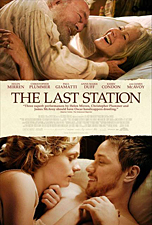
Get out your hankies for two old fashioned romantic dramas
film from a queer perspective
Reviews
| KATM media outlets |
| KATM featured weekly |
| Join Us! |
| KATM on RT |
| Vidcast Starring KATM |
| NOTE: THIS SITE ONLY LOADS CORRECTLY WITH EXPLORER AND MOZILLA BROWSERS - SORRY SAFARI USERS! |
| Buy the KATM Book |
Love Is All Around:
Dear John-The Last Station
Expanded Edition of 2-3-10 KATM Windy City Times Column
By Richard Knight, Jr.
Dear John-The Last Station
Expanded Edition of 2-3-10 KATM Windy City Times Column
By Richard Knight, Jr.
| With the approach of Valentine’s Day, love is in the air as the movies move into February. And two films opening this weekend, both old fashioned and emotionally satisfying in their approach, offer love struck moviegoers both young and old plenty to bask in. Author Nicholas Sparks has cornered the market for modern romantic novels with five bestsellers in a row. Though the majority of the books have been adapted for the screen none of them has had the same kind of commercial success. But that hasn’t stopped many of these pictures from connecting with viewers who love nothing more than getting out their hankies. I offer my husband as Exhibit A. No matter what time of day or night, if he’s cable flipping and The Notebook or Nights in Rodanthe is on he will stop and in seconds become immersed in the romantic waterfall flowing from the screen. If I don’t quickly grab the remote out of his hand and break the love spell, I can be assured that I’m about to spend extended time once again in Sparksland. When it comes to affairs of the heart Sparks’ characters never find love without paying a heavy emotional price. All of which makes director Lasse Hallström, whose biggest successes have been with the über romantic Chocolat and the nostalgic, tender and tragic Cider House Rules, the perfect choice to helm Dear John, the latest screen adaptation of a Sparks big time success. The movie set in South Carolina as many of Sparks’ stories are, follows his two fetching would be lovers over the course of their extremely bumpy road to Eternal Love. Channing Tatum plays John Tyree, a hunkalicious surfer on leave from the Special Forces in the Army who in the spring of 2001 “meets cute” with Savannah Curtis (Amanda Seyfried) when he dives off a dock to retrieve her purse (Tatum’s gay fan base is sure to rise thanks to the large number of shirtless beach scenes). He’s a moody loner, used to taking care of himself and guarded with his emotions while she’s sunny, open and a do-gooder, not at all the traditional Southern belle that her wealth and privilege would lead one to expect. The two have an intense two week affair before John is called back into action. Their only argument occurs when Savannah intuits that John’s ultra shy father (Richard Jenkins, marvelous in a supporting role), who only comes alive when he’s working on his coin collection or making dinner, might have some behavior problems and hothead John reacts defensively. But the two make up – passionately – and promise to write until John’s return (this being 2001 when texting was not an option). Then Hallström gives us one of the movies corniest set pieces – the love letter exchange montage – in which we actually see the postal service in action (I haven’t seen this hoary old device trotted out since 1973’s TV movie The Letters with Barbara Stanwyck, John Forsythe, et al). Right on cue a gently plucked guitar and lush strings wash over the screen. But trouble looms for our comely pair – he with the pouty upper lip and big feet and she with the long blonde hair framing the prominent forehead, slightly bulging fish eyes and large lips (she’s like the human embodiment of a Bratz doll) – and before this interrupted love melody can be finished the story will involve the 9/11 tragedy, cancer, autism, dappled sunsets by the beach, moonlit nights spent apart, and a lot more musical montages (Deborah Lurie’s score and several well chosen songs underscore the heavy emotional reverses happening on screen). Both young leads do their thing with the requisite passion required (though oddly, neither sports a southern accent) and Hallström’s unhurried pacing guarantees that by the fade out both tears of grief and joy will have been shed. Like the other Sparks adapted movies, Dear John is so old fashioned and it’s hyper romanticism such a rarity in cinemas these days it almost seems new again (there are heavy hints of Splendor in the Grass in the emotional journey the two leads endure). It will more than satisfy those with a predilection for the genre but cynics are warned to keep clear – or be prepared to shut up and hand some Kleenex to their cow eyed better halves. Cynics are also warned to avoid The Last Station from director Michael Hoffman. Hoffman has adapted Jay Parini’s novel, based on true events, of the last days of acclaimed Russian writer Leo Tolstoy and the war over the rights to his valuable copyrights (“War & Peace,” and “Anna Karenina” were just two of the titles in contention) between his wife of 43 years, Countess Sofya and the leader of Tolstoy’s acolytes, Vladimir Chertkov. Hoffman, who has directed his share of romantic dramas and one of my camp favorites, Soapdish, gives the material his all and with this fascinating story, three grand thespians like Christopher Plummer as Tolstoy, Helen Mirren as Sofya and Paul Giamatti as Chertkov to shoot off the acting fireworks, and James McAvoy and Kerry Condon as the young lovers who provide the film with its lusty subplot, who can blame him? Tolstoy, the Bob Dylan of his day, was so influential a literary and cultural figure that he inspired a fervent group of followers known as “Tolstoyans.” This pro-Tolstoy movement eschewed material possessions and advocated the spread of passive resistance during the last decade of Tsarist rule in Russia. The movie, told through the eyes of Valentin (McAvoy), one of Tolstoy’s starry eyed devoted followers, is set in Russia in 1910 near the summer home of Tolstoy where a group of the supplicants are living in a commune. Valentin has a major case of star worship and not even a hot affair with the nubile Masha (Condon) can shake his devotion to the group. As Tolstoy’s new secretary, Valentin becomes a pawn in the ruthless tug of war between Chertkov and Sofya over Tolstoy’s new will. The protracted battles between Plummer and Mirren (who has her best role since The Queen) in which Sofya uses every trick in her emotional arsenal and their tender moments in between are thrilling, fun and deeply satisfying to watch. These are great actors having a whale of a time with tremendous parts (and Plummer is freed by not having the usual sour character to play). From the moment we first see the couple having afternoon tea on the terrace their philosophical differences – despite their deep affection – is clear. He represents the coming Communist viewpoint of the People trumping the needs of the individual while she represents just the opposite. It will be a fight to the acting death it seems and, indeed, as Sofya shamelessly schemes to get rid of Chertkov (who has an additional aid in the Tolstoy’s distant daughter), things go from promising to comical to the emotional breaking point for all concerned. The Countess refers to Chertkov as “a sycophant and a pervert” (and at one point rails at Tolstoy about “his boyfriend”). But Tolstoy is no pushover and time and again Sofya is blocked. The movie centers on the larger theme of the responsibility of the artist to his legacy and his audience vs. responsibility to the personal which Hoffman nicely balances (along with the subplot of the young lovers who represent the young, idealistic version of the Tolstoy’s). The situation leads to plenty of heartbreak, some sexy digressions and as noted, lots and lots of acting pyrotechnics. All of which help envelop the viewer in The Last Station, which, despite some dramatic implausibility and a misstep here and there is overall a very well told, well made historical romantic drama. |





